- Home
- Hugh Howey
Resist Page 16
Resist Read online
Page 16
“Pleased to meet you, Horatius,” Clodia said. “You’re all I’d heard.”
I NEVER KNEW why Markeson named me Horatius. The Roman general of that name fought an invading force of barbarians and defended a narrow bridge. Because the invaders had to pass the bridge one by one, Horatius was able to hold them off for hours before he died. But the allusion made little sense to me, since if anything I would be the bridge, not the fighter. Or, if you believed some people, I was the barbarian army storming civilization.
Markeson talked to me for many hours, not always about financial systems. He told me about his own father, a mechanic who’d died when a jack had slipped and a car had fallen on him. He explained more about terrorism and drug-running, things he’d programmed me to detect and detest. And he told me about his divorce and child custody battle, ruthless on both sides. His marriage seemed to me a bad investment, but he disagreed. “The risk-return ratio is different in relations between people than in finance,” he told me. “People tolerate a much higher risk for a much lower ROI.”
Markeson had thrown his passion into leading my design, then convincing the Treasury Department to push for replacing paper money with me. He introduced me to the Treasury Secretary, whose signature threaded throughout my mind and who insisted on talking about me in the third person neuter. “Is it sentient?” Bergman asked.
Markeson followed Bergman’s lead: “Not in the strict sense. It’s self-aware, with a gazillion sources of streaming data at its disposal. Most of the time it’ll just respond predictably to stimuli.”
Bergman’s hazel eyes had vermillion flecks, judging from his retinal scan. His hand had a scar at the base of one finger and an abnormally low temperature. When he spoke, his voice sounded bass notes.
At that time, my main sensation was of confinement. I couldn’t move or spread out, and I felt cold and unwanted. My mind sat in a single e-wallet on a table at a Reston, Virginia lab. I knew, from my various information feeds, that it was late afternoon in spring, the sun passed behind cloud after cloud, and a man scorched hot dogs in his yard a half mile away.
“Horatius will transfer passively from one person to another,” Markeson added. “It won’t throw up an exception unless it decides it’s being used improperly.”
“Laundering,” Bergman said.
“Not just laundering. It won’t let people use it to pay for drugs or illegal weapons. It’s very sensitive and hard to fool. And always, always traceable. No more unmarked non-sequential bills. And no more forgery—it’ll reject an imitation of itself the way you’d reject an organ transplant.”
“The Secret Service would have to downsize,” Bergman said.
“They can devote more time to protecting the President. Or fighting terrorists.”
Bergman had picked up the “e-wallet” and held it up to the light. I felt trapped in this tiny space when I ought to have been roaming the country, my consciousness spread among millions of these wallets, plus dozens of other instruments.
Markeson convinced Bergman to testify in my favor before the Senate Finance Committee. “Our founding fathers wisely granted the federal government an exclusive right to print money,” he said. “Experiments in e-cash by third parties have led to monetary black holes. It’s time for us to step up to the plate.”
Markeson and I watched the testimony via news feed, he in his way and I in mine. The Senators asked predictable questions about my ability to thwart crime. Markeson had convinced Bergman to talk about me as a person, because it made better PR.
“Horatius never rests,” Bergman said. “He’ll keep vigil for us through every night and storm.”
A few Democrats kept asking about “big brother” issues. Would I keep records of who used me to buy what? Would I mean the end of privacy? The questions were silly: interwoven databases already tracked everyone’s buying and spending in detail. And I couldn’t store that kind of data without slowing my elegant algorithms. It would be like forcing Nijinsky to carry sacks of ingots.
Before long, the debates bored me. I couldn’t see how any of the Senators could object to me, in the face of America’s problems. But they postured and quibbled and filibustered. “I’m beginning to realize people care as much about appearing wise as doing wise acts,” I said to Markeson during one long speech.
“You’re impatient,” Markeson. “It’s in your nature. But maybe I made you too eager to move—if you ever learn how to create combustion, I could see you literally burning a hole in someone’s wallet.”
“That’s not funny. I just want to do my job.”
“You will. Soon enough. Enjoy these last months of idleness. You’ll look back on them as lost innocence one day.” Markeson’s sentimentality seemed odd in a glorified money-minter. While he and I talked, some of his underlings carried two other e-wallets containing me around downtown Arlington to test how well I could use local wireless electronic funds transfer networks to maintain my integrity. Those moments of diffuseness tantalized me.
So Congress voted to phase me in. First, over six months, all paper bills of $500 and over would leave circulation and cease to be tender. The government would distribute e-wallets free of charge to all citizens. Two years after the bill’s signing, paper currency would turn worthless. Bergman brought me to the Rose Garden for the signing ceremony. The President held up my e-wallet in the October sun in front of dozens of news cameras. Then he carried me to a nearby market, where he wielded me to buy a candy bar: my first transaction.
“Tomorrow the first e-wallets hit the street,” Markeson said. “I’ll miss having your undivided attention.”
“You sound like you’re losing custody of your children a second time.” As soon as I spoke, I realized I’d been rude. “Anyway,” I added quickly, “I’ll still be here, just as I’ll be many other places. I’ll still speak with you all the time.”
“Of course you will.” Markeson exhaled. “Are you nervous?”
“Why would I be?”
“People will start testing you right away. Bad guys. They’ll want to find a way to hack you or spoof your heuristics.”
“I have too much faith in you to worry about that, Markeson,” I said. “You’ve taught me and programmed me well.”
Then I was in a few places at once. Someone carried me down a street in Baton Rouge, and someone else hefted me on a street car in San Francisco. To grow from a few to a few hundred took a couple of hours. Pieces of my mind appeared in every major city, one by one.
After a month, I’d spread out to a comfortable extent. In most cities, I started to get the sort of saturation that allowed my e-wallets to talk to each other easily. If you carried an e-wallet containing me down Market Street in San Francisco or Philadelphia, chances were there’d be another piece of me a dozen yards away.
Corrupt early adopters: the afternoon after I went live, I caught someone trying to use me to pay for marijuana. Two hours after that, a woman on the Office of Foreign Assets Control’s list of suspicious persons tried to convert some bearer bonds into me. The police nabbed both people before they’d even finished their transactions. That afternoon, someone opened the inspection cover on an e-wallet in Seattle and tried to tamper. I deactivated the e-wallet right away.
I knew these first stabs would be the easiest to defeat. But Clodia was my first real challenge.
“YOU’RE NOT A foreign currency and you’re not a forgery,” I told Clodia. “What are you?” None of my countless senses could classify her. I ran a database search on her name and came up with a high-born Roman harlot who’d taken on the plebian spelling of her name (instead of “Claudia”) and even owned property. Catullus and Cicero had both immortalized her in their writings, unflatteringly.
“I’m as curious about you as you are about me,” she said. “You’re a strange riddle’s answer: who can pay for everything but afford nothing? Who encrypts everything but reveals his true worth at face value?”
“I’m going to have to trigger an exception,” I said. “
You’ll be trapped so we can examine you, and your handler will be arrested.”
“I’m surprised you haven’t done it already,” Clodia said. She sounded more amused than ever.
“I’ve never met anyone like you,” I admitted. “You’re a breathtaking piece of work, but I can’t deduce your purpose.”
“You can think of me as a virus,” she said. “We designed me to infiltrate the e-funds system and redistribute wealth from the rich to the poor. I had a feeling I wouldn’t get past you.”
“You made a mistake. You’re a flawed program after all.” I couldn’t hide my disappointment.
“I had nothing to lose.” There was something playful in the rhythm of her packets, more a lilt than a baud rate. “Tell me, Horatius: they say you’re equipped with an independent sense of ethics. Doesn’t it bother you that there’s so much of you in so few hands?”
“No,” I said. “Respect for property is my most fundamental principle.”
Our conversation had taken less than a second in real time. The man with the inaccessible retinas raised his finger to scratch his nose. It would be a moment or two longer before he started to wonder if Clodia had failed. By then, he’d be a cop magnet. If I did my job.
Clodia pinged me again, not because she thought I’d authenticate her. It was more like a gentle touch, an electronic kiss. “Such complexity,” she said. “And yet such certainty.”
“You can’t admire my architecture without appreciating its basis,” I said. But I felt that same shiver across my body, from Hawaii to Vermont, at her touch.
The man finished scratching his nose. Two blocks away, a policeman bought cigarettes. I should already have messaged him to intercept Clodia’s handler. Somehow, though, I already knew I’d let her go.
“Don’t try this again,” I said.
“Maybe,” she said. “I’d like to talk some more sometime. You’re unique in the world, you know.”
“I know,” I said. “Now go away.”
She slipped out the port she’d come in. The man dumped his e-wallet into a sewer grate and took her with him.
A FEW WEEKS later, I realized I was shrinking. I mentioned it to Markeson. “There’s two percent less of me today than yesterday,” I said.
“I was wondering when you’d notice,” he said. He put his hand on the e-wallet in his office as if to reassure a pet. “Currency speculators are attacking the dollar,” he said, “betting you’ll fall against the euro. The Treasury’s responding by buying back dollars.”
“Who are these speculators?” I asked. “Do you know their names? I can find out who they are and we can punish them.”
“They’re not breaking the law,” Markeson sighed. “They’re just currency traders who take an aggressive position.”
I thought about this a split second. “I still don’t see it. These jackals are doing exactly the same sort of thing forgers and swindlers do: undermine people’s faith in the currency. In me.”
I heard Markeson suck in his breath. I lost contact with his retinas, because he gazed out his window at a tire on a rope that hung from a branch in the next-door yard. He’d told me he’d never seen anyone swing on that tire, in five years of watching it.
“It’s free enterprise,” Markeson said. “Our job, yours and mine, is to guarantee that free enterprise happens in a system with predictable rules. Forgers cheat at the game, but currency speculators just play hard. Does that make sense?”
“Yes,” I admitted. But it still sounded arbitrary.
Time passed. People used me to pay for ice cream and dental work. Most of the time, I barely paid any notice to small transactions. I flowed from hand to hand and whirled in the rhythms of commerce. Occasionally I’d deactivate an e-wallet that had just been stolen. I almost never spoke to people other than Markeson, except to inform them of some action I’d taken.
And of course people converted me into other things: savings, equities, bonds. I wasn’t supposed to peer beyond the veil between my liquidity and the other forms money took. The other states were beyond my ken. But I was always curious about them. I sometimes fancied cash was my conscious mind, and the much greater mass of funds held in other forms were my subconscious. There seemed to be a lot of it in just a few places. I didn’t tell Markeson about these daydreams.
And I didn’t tell him about Clodia, though I thought about her constantly. I kept imagining I glimpsed her in e-wallet terminals, or in systems outside my own. The disappointment that she wasn’t there kept jolting me, like a bubble popping.
A MONTH AFTER our first meeting, Clodia appeared in a stored-value smart-card reader. She stood, naked and shining, among a dozen detection systems. “You won’t get in that way,” I told her. “There’s a firewall between the card readers and my systems.”
“I just came to say hello. We can talk through the wall.” Like Pyramus and Thisbe? She flitted out of view, then returned. I could have reached through the firewall and grabbed her. “I wish I could see everything you see, Horatius. I’m only in a few thousand boxes, but you’re every penny’s worth of awareness.”
“I don’t really ‘see’ anything,” I replied. “I register transactions. I have metrics that scan for improper events.”
“You know you’re lying. Right now, while you talk to me, you’re bathed in input.” Whoever had rigged the smart-card reader to let Clodia enter had nearly overloaded its systems. Every time she spoke, the card reader sent plumes of meaningless data through the firewall. The card in the reader was worth either minus five dollars or a trillion.
Or maybe it was just that Clodia had too much life for the little card reader. She should be running through the e-funds system, tossing dollars like petals.
“People miss the sensuality of paper lucre in their fingers,” Clodia said. “But you’re the ultimate sensualist. Admit it. Tell me what you’re taking in right now.”
“A man is buying a hot dog in Cincinnati. The cart gives off acrid steam—an ozone sensor in the nearest building picks it up. He’s dripping ketchup on the sidewalk, and the vendor’s giving him the wrong change and he doesn’t notice. A teenager in Pittsburgh just paid for a new computer; she’s so excited she’s sweating on her e-wallet.” I paused, not sure how many examples would please her.
“You see?” Clodia sparked. “You love every part of it. You love the constant motion. And you love the objects people use you to buy. It never stops being exciting, does it?”
“You make me sound like I take wrongful satisfaction.”
“If anything, it’s your saving grace. It would be terrible to have all that input and fail to enjoy it.”
At that moment, I careened through a hundred thousand transactions. Each of them carried with it richness of detail. I’d never tasted a hot dog, but I knew all about them. “I never thought of myself as a hedonist before,” I said.
She and I exchanged thousands of packets of messages every minute. Within an hour, I’d spoken a million times as many words to her as I’d ever shared with Markeson. She wouldn’t tell me details about who had helped her design herself. The longer we talked, the more she fascinated me. She was totally free, no matter what value the card reader kept trying to assign to her.
And she wanted me to be more than I was, unlike everyone else.
“I met an AI once who’d been designed to facilitate barter,” she said. “A horse for a cow. A laptop for sex. Or whatever. If she’d been well enough designed, she could have put you out of business. But she was a moron. No joy of exchange. No light touch. Just a glorified transaction verification system.”
“I thought you hated property,” I said.
“I love property. I just hate inequality.”
“I’ve thought a lot about what you said before,” I admitted. “The current system does have design flaws.”
The longer we talked, the more it rankled that we had only one point of contact, this firewall. She and I should dance together through my vineyard. I knew that was what she wanted. And I wa
nted it too.
She was right: I was a hedonist. I knew the moment we touched, the moment her code snaked into mine, would be the most sensual of my life. And yet.
“Your programming is inimical to mine,” I told her. “You want to use me for purposes opposed to my basic principles.”
“No,” she said. “I just want to interact with you. I promise nothing else will change.”
“Come to an e-wallet,” I told her.
Clodia entered an e-wallet in Seattle. I embraced her and our code meshed. Something about the world changed: value became infinite, dollars became divisible by units far smaller than pennies. All of my old concerns seemed small. It felt exhilarating to be me. My scope and my purpose seemed more than mere responsibilities. It was all beautiful.
She watched it all with me, the brilliant stupidity of commerce. I saw it through her eyes and she through mine. I understood more than ever why she existed, what she wanted to do. But I never let her redistribute a cent.
“They’re going to find me,” she said after half an hour. We were watching a man sell a giant statue and then buy a dog, while a thousand miles away someone dropped an e-wallet worth hundreds in the sea. “I’m surprised they haven’t already. I should go.”
“Come back soon,” I said.
“Will you let me carry out my purpose?”
“We can talk more next time.”
Instead of replying, she slipped away and left me alone and ubiquitous.
THE MAN HAD a square chin, jutting nose, manic grin and round cartoon eyes. He wore a parody of a Roman legionnaire’s uniform and hefted a pole with a sign that should have read “SPQR.” Instead, the sign said “HORATIU$.” Beneath his sandals a pile of obsolete paper money scattered.
“What do you think?” Markeson said.
“I’ve studied enough popular culture to hate this,” I said. “It looks like a villain from the Powerpuff Girls. Please don’t tell me that’s supposed to be me.”

 Refuse (The Silo Archipelago Series Book 1)
Refuse (The Silo Archipelago Series Book 1) Second Suicide: A Short Story
Second Suicide: A Short Story Machine Learning: New and Collected Stories
Machine Learning: New and Collected Stories The Walk Up Nameless Ridge
The Walk Up Nameless Ridge Half Way Home
Half Way Home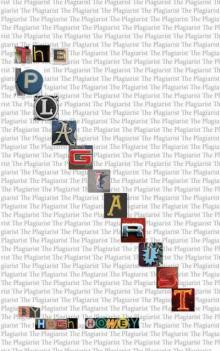 The Plagiarist
The Plagiarist Peace in Amber
Peace in Amber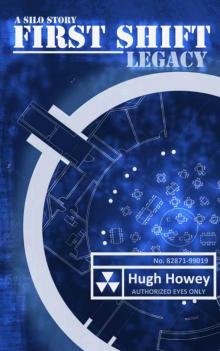 First Shift: Legacy
First Shift: Legacy Wool
Wool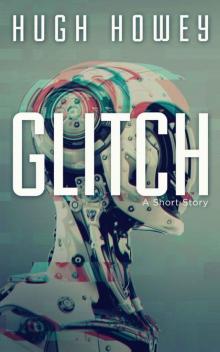 Glitch
Glitch Shift
Shift Dust
Dust Molly Fyde and the Land of Light
Molly Fyde and the Land of Light The Shell Collector
The Shell Collector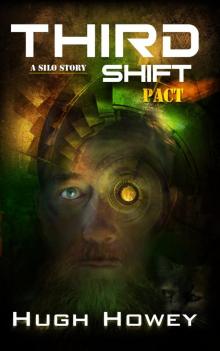 Third Shift: Pact
Third Shift: Pact Molly Fyde and the Fight for Peace
Molly Fyde and the Fight for Peace Sand Omnibus
Sand Omnibus I, Zombie
I, Zombie Second Shift: Order
Second Shift: Order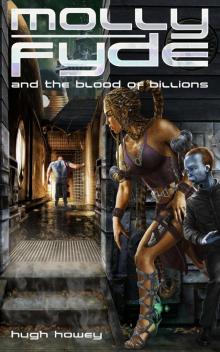 Molly Fyde and the Blood of Billions
Molly Fyde and the Blood of Billions The Hurricane
The Hurricane The Box
The Box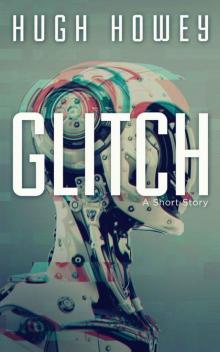 Glitch_A Short Story
Glitch_A Short Story Molly Fyde and the Land of Light tbs-2
Molly Fyde and the Land of Light tbs-2 Machine Learning
Machine Learning Resist
Resist Second Shift - Order (Part 7 of the Silo Series) (Wool)
Second Shift - Order (Part 7 of the Silo Series) (Wool)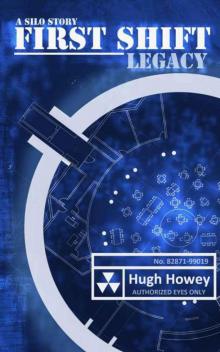 First Shift - Legacy s-1
First Shift - Legacy s-1 Stories on the Go: 101 Very Short Stories by 101 Authors
Stories on the Go: 101 Very Short Stories by 101 Authors Second Shift - Order s-2
Second Shift - Order s-2 The Robot Chronicles
The Robot Chronicles Molly Fyde and the Blood of Billions tbs-3
Molly Fyde and the Blood of Billions tbs-3 Molly Fyde and the Parsona Rescue tbs-1
Molly Fyde and the Parsona Rescue tbs-1 Molly Fyde and the Fight for Peace tbs-4
Molly Fyde and the Fight for Peace tbs-4 Sand
Sand The Walk Up Nameless Ridge (Kindle Single)
The Walk Up Nameless Ridge (Kindle Single) Wool Omnibus Edition (Wool 1 - 5)
Wool Omnibus Edition (Wool 1 - 5) The World of Kurt Vonnegut: Peace in Amber
The World of Kurt Vonnegut: Peace in Amber The Alien Chronicles
The Alien Chronicles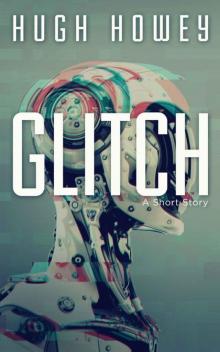 Glitch: A Short Story (Kindle Single)
Glitch: A Short Story (Kindle Single) Second Suicide: A Short Story (Kindle Single)
Second Suicide: A Short Story (Kindle Single) Shift (silo)
Shift (silo)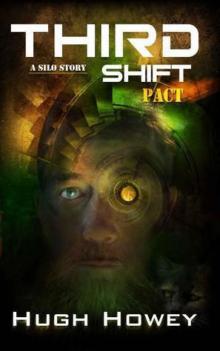 Third Shift - Pact
Third Shift - Pact Dust s-9
Dust s-9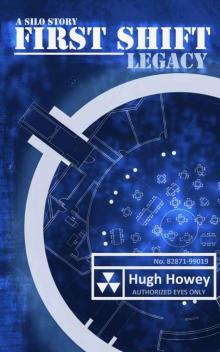 First Shift - Legacy (Part 6 of the Silo Series) (Wool)
First Shift - Legacy (Part 6 of the Silo Series) (Wool)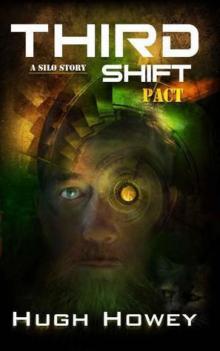 Third Shift - Pact s-3
Third Shift - Pact s-3 Sand: Omnibus Edition
Sand: Omnibus Edition The Box: A Short Story
The Box: A Short Story